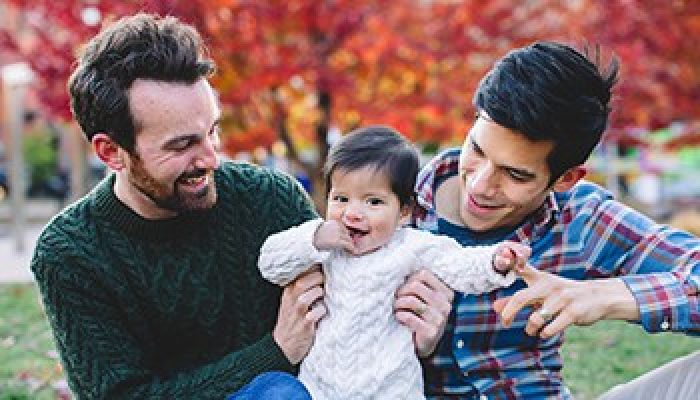Families come in all forms, and families formed by adoption are inspiring because they impact so many lives. Early on in their relationship, Gordon and Brian discovered their shared longing for fatherhood. “Pretty quickly we realized we were two men who both had dreams of starting a family,” explained Gordon, “and weren’t sure about how to do that.”
The couple explored their options of foster parenting, surrogacy or adoption, eventually settling on adoption. “We were looking for a LGBTQ-friendly adoption agency and LCFS had come recommended, so that was important to us.”
Brian commended LCFS Adoption Caseworker Tara Dull for how thoughtfully she and her colleagues guided Gordon and him to begin their adoption journey. “Being at that initial preparation class, seeing other queer couples and couples of color was really special.”
“LCFS’ adoption meetings were probably some of the most insightful moments we had in the pre-adoption process,” Gordon said of the LCFS Adoption Preparation Series they attended in early 2019. “It just opened up the world of adoption, which was so new to us.”
By May of 2019, the couple felt prepared to take their adoption search public. There were disappointments early in their process when a potential birth mother stopped contact in August, but they persisted in their search as it stretched into the next year.
In February 2020, Brian and Gordon received a text from Michelle (not her real name), who was pregnant with her second child and wanted to find a great family for adoption. On Valentine’s Day, Brian and Gordon had their first FaceTime call with Michelle, which made her comfortable to consult with the birth father Juan (not his real name) about making an adoption plan. “That FaceTime call totally solidified the connection and you could tell that Michelle was so relieved.”
Gordon and Brian then flew from Chicago to Atlanta to meet with the birth parents and a LCFS-recommended adoption lawyer. Michelle thoughtfully scheduled an ultrasound for them, where they found out that the baby girl was due a month earlier than expected, just four weeks away.
The early due date and fears of an impending COVID lockdown convinced Gordon and Brian to return to Atlanta in early March and stay until the birth, forcing them to adapt quickly.
In a pre-delivery checkup, the doctors couldn’t detect fetal movement, so they went to the hospital in case this was something serious. It turned out to be nothing more than a deep sleeping baby, but because of COVID putting stress on hospital resources, Michelle was advised to stay in the hospital until she gave birth. “Michelle couldn’t get a room, so we were in a little urgent care room for a long time,” Brian explained. “They induced her and then nothing, so I slept in a little cot next to her hospital bed,” Brian said.
Michelle gave birth the next morning to baby Ada. “We’d chosen Ada’s name. We shared it with Michelle and Juan. They were the only people we told, and they loved it. We chose it because we thought it was beautiful… and it fit her identity,” Brian said. Only Brian was allowed in the delivery room due to COVID, so Gordon could only see his new daughter through phone video or when nurses would hold her up to a window for him to see.
During the hospital stay, Michelle and Brian took turns feeding Ada, with Michelle giving new father Brian feeding tips. “I remember when I was on FaceTime, the nurses were like ‘how many milliliters did she drink?’ and Brian being Brian that is not his world at all. He’s like ‘Milliliters? What are you talking about? What’s a milliliter?’,” Gordon laughed, “So we both had a lot to learn, but Brian had the two days before me where he really had to learn in the moment.”
Brian learned from the LCFS preparation series that birth mothers often choose to spend some time alone with their babies. He said that was “some of the most helpful information we learned from LCFS.” So, the couple understood why it was important for Michelle to have time alone with her newborn in the hospital.
A few days later, they all met at a lawyer’s office to sign the papers finalizing the adoption, but because of COVID restrictions, only one of them could be in the office at a time. “Gordon and I had to take turns being outside, it was such a strange time,” Brian recalled. The next day before heading back to Chicago, baby Ada met her birth father who held and fed her, as well as her four-year-old half-sister, who gave her a special gift of a traditional Mexican dress.
“The pediatrician said absolutely no airplanes and no hotels,” so Brian and Gordon took turns driving a rental car from Atlanta to Chicago in one day, stopping every two hours to allow Ada time out of the car seat and to lie flat, per doctor’s orders.
Once they got home to Chicago, “Tara was wonderful throughout the process,” Brian said. “We had the three post-placement visits with Tara, two were over video and one where she came here in person. We felt very supported by Tara.” The couple has an open adoption and still communicate regularly with Ada’s birth parents.
Eight months later, “It’s been so magical to see her grow and develop. All of my friends who are parents told me how amazing parenting is but I never understood the details,” Gordon explained. “There’s a lot of adjusting. A lot of tiny tweaks to everything.”
These adjustments are vastly outweighed by the joy of parenthood. “We’re hoping to adopt again,” Brian said. “We’d love to have two children and we intend of course to go through LCFS and Tara again.” LCFS cherishes its success stories and helping to build beautiful forever families like Gordon, Brian and Ada’s.






